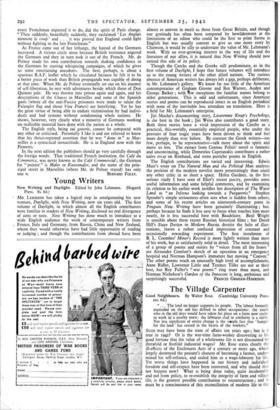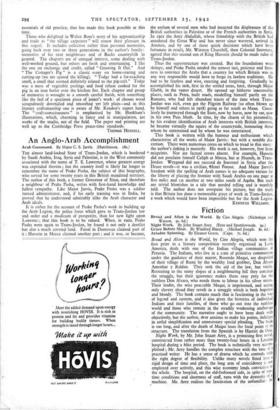The Village Carpenter
" ... The land no longer supports its people. The labour formerly expended on the soil has drifted to other occupations: the youth who in the old days would have taken his place on a farm now cycles to work in a nearby town: the labourer clad in corduroy is a rarity. Not less significant of entire change is the sianple fact that ' hunger for the land' has ceased in the hearts of the workers."
Such may have been the state of affairs ten years ago ; but is it true in 1942? Or is the war-time farm-worker discovering to his good fortune that the value of a wholesome life is not discounted by threefold or fivefold industrial wages? Mr. Rose states clearly the ill-effects of the Enclosures Acts of a century or more ago, which largely destroyed the peasant's chances of becoming a farmer, under- mined his self-reliance, and sealed him as a wage-labourer for life. Yet worse things have happened in our history and individual freedom and self-respect have been recovered, and why should that not happen now? What is being done today, quite incidentally and not from policy, to re-establish the integrity of farm and village life, is the greatest possible contribution to reconstruction ; and it must be a consciousness' of this reconciliation of modern life to the essentials of old practice, that has made this book possible at this time.
Those who delighted in Walter Rose's story of his apprenticeship and trade as " the village carpenter " will renew their pleasure in. this sequel. It includes collective rather than personal memories, going back over two or three generations in the author's family : memories of his near neighbours and of Bucks countryfolk in general. The chapters are of unequal interest, some dealing with well-worked ground, but others are fresh and entertaining. I like the one on exchange and credit, called " Gnawing It Out." And " The Cottager's Pig " is a classic essay on home-rearing and cutting-up (we are spared the killing). " Todge had a far-reaching smell, a smell that seemed definitely related to the pig-cult." Todge was a mess of vegetable peelings and food refuse cooked for the pig in an iron boiler over the kitchen fire. Each chapter and group of memories is wrought to a smooth careful finish, with something like the feel of a specimen piece of joiner's work: of chosen wood scrupulously dovetailed and smoothed yet left plain—and in this literary craftsmanship one is aware of Mr. Kendon's expert hand. The " craft-consciousness " is emphasised by Mr. Hookham's illustrations, which, charming in fancy and in manipulation, are works of the studio, not of the field. The paper and printing are well up to the Cambridge Press peace-time standards.
THOMAS HENNELL.



























 Previous page
Previous page